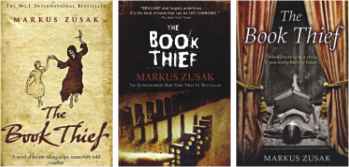BOOK REVIEW
Courage under fire
A look at the five types of men (neutral gender)
Mankind has a big mouth
 This mouth, in prehistoric years, developed the ability to relay his thoughts and demands to fellow Cro-Magnons. He could say extremely important things like, “My cave” and “saber-toothed tiger”. In more recent years, closer to Atlantis and Ancient Greece, the mouth developed a new ability. Lying, it's commonly called: the distortion of facts, the stating of what is not so as if it were. Religions will condemn it in their typical idealistic way, but the realistic human accepts it as a vital component of modern life, the stock market and other such matters.
This mouth, in prehistoric years, developed the ability to relay his thoughts and demands to fellow Cro-Magnons. He could say extremely important things like, “My cave” and “saber-toothed tiger”. In more recent years, closer to Atlantis and Ancient Greece, the mouth developed a new ability. Lying, it's commonly called: the distortion of facts, the stating of what is not so as if it were. Religions will condemn it in their typical idealistic way, but the realistic human accepts it as a vital component of modern life, the stock market and other such matters.
And it so happens that the big mouth's first-born ability, having had too long to grow, has become a rather overconfident and troublesome thing, as first-borns are prone to do. It tends to go on a bit, and often with a sort of unpleasantness that irritates the fellow Cro-Magnons, turned bankers and politicians, getting the possessor of the mouth into difficult situations. It often falls, then, to the younger and more subtle siblings to weasel them out of trouble. It is a man's (neutral gender) behaviour in these situations that can come to define him.
Many men, although goodhearted, healthy and strong, are unable to deal with pressure.
In the face of cold disbelief, these men crack. You can see the fissures running along their faces as their mouths start to twitch and nervous eyes flit from side to side. Then, they crumble. The frantic body movements become more exaggerated, switching from the twitching face to the twisting hands. Anything nearby is picked up and fiddled with; perspiration may bead the upper lip and brow. Inevitably, they cave. They speak, but they might as well not have.
We take a classroom as an example. A certain student (call him Boy) has done one of the many things that are inexplicably criminal in a teacher's book, like copying the answers to a test off his arm. We find, now, that Boy is one of the aforementioned good men. As the teacher fixes him with the glare, and asks him why he has failed to study , he cracks, crumbles and caves, and falls back on the one excuse we all, including the teacher, were hoping he would not fall back on.
“I forgot.” Being an example, Boy is typical of those he exemplifies. Good men, under pressure, say they forgot. Aside from failure, they also often get a sharp retort for their trouble. In Boy's case, it's:
“Why didn't you forget to come to school?”
There is another type of good men, the more annoying, overly-honourable type.
He decides to forget lying and other sensible courses of action, and instead follow the path of righteousness, hoping fate will reward the honest. We laugh at him, but it may interest our readers to know that he has a higher success rate than his previously discussed brothers. Moving on.
Another type leans more towards comedy than wholesomeness.
He has some use of the second generation of oral abilities, but applies it for the greater good rather than to save his own skin. When he is in trouble and knows there's a crowd around, he prefers to make them laugh, instead of actually getting out of trouble. A clown, one might call him. Going back to the classroom, he's the one saying, “My dog ate my homework,” and “The doctor's put me on a no-geometry diet.” The teacher grudgingly gives him a smile. Right before assigning him more homework.
Finally, to the cleverest of the lot. They don't lose composure under pressure.
It may even stimulate their skills. They're so good, in fact, that they nearly believe themselves. We have, however, through careful study, picked up a couple of the signs: their stories are often told in excruciating detail, with as many facts taken from the truth as possible; everything is said casually, hardly looking into the listener's eyes; if they can, they even make people feel guilty for asking. This group, we respect the most and like the least. We're still trying to gain entry.
By Grasshopper
BOOK REVIEW
The Book Thief by Markus Zusak
When a book stays on the New York Times Bestseller List for 190 weeks that's a couple of months less than four years there's a reason for it.
“The Book Thief” is a novel based in Nazi Germany, unfolding the tale of a young girl's maturity and growing bond with her foster family, their struggle during the war and the tale of love and loss. More importantly, this is a tale narrated by Death himself, at a time when he was “extremely busy.”
 Death first came across our protagonist Liesel Meminger when she lost her dear brother and was preparing to move to a foster family in order to be protected. As a last token of her past family and her brother's memory, Liesel stole her first book from the grave-digger's apprentice, despite being uneducated at the time. Initially, she cannot adjust to her new family, the Hubermanns, but with time she develops unique bonds with both Hans and Rosa. Her 'papa' Hans would read to her as well as teach her to read and write, while Rosa bonded with her in a much rougher manner, while helping her with house chores. Liesel is presented with two books over Christmas, while her foster brother, a Hitler devotee, retorts she should be reading Mein Kampf. She becomes best of friends with her neighbour Rudy Steiner.
Death first came across our protagonist Liesel Meminger when she lost her dear brother and was preparing to move to a foster family in order to be protected. As a last token of her past family and her brother's memory, Liesel stole her first book from the grave-digger's apprentice, despite being uneducated at the time. Initially, she cannot adjust to her new family, the Hubermanns, but with time she develops unique bonds with both Hans and Rosa. Her 'papa' Hans would read to her as well as teach her to read and write, while Rosa bonded with her in a much rougher manner, while helping her with house chores. Liesel is presented with two books over Christmas, while her foster brother, a Hitler devotee, retorts she should be reading Mein Kampf. She becomes best of friends with her neighbour Rudy Steiner.
Meanwhile, the Hubermanns give shelter to a Jew Max Vandenburg, to return a favour done by the latter's father to Hans. Liesel quickly takes a liking to him. As the novel progresses, Liesel and Rudy often steal food, and while stealing her second book, Liesel is spotted by the mayor's wife. It turns out she is a friendly lady who later gives Liesel access to her library. Soon, the story takes a more serious turn. Our narrator, Death, shows us just how busy he is. Trouble comes in the form of the Nazis. Max has to leave. And there comes a time Liesel and Death meet once more, only the damages are crueller. It is of course a novel in the time of war. And as with other war tales, tragedies are inevitable.
Despite being a pretty decent sized book, the narrative is hardly monotonous thanks to the fabulous writing style. You'll learn plenty of German swear words - very satisfying. The best thing about this book however, is how it can make the readers roll on the floor laughing at one moment and bawling their eyes out at another. The characters are lovable, the twists are unpredictable and it is a very good read. It's a war story worth crying over.
By Padya Paramita
I hate Bieber haters
Why do you hate Justin Bieber?
because-
1. He sings owsum?
2. He is good looking?
3. He gave 1 million to Japan?
4. you are jealous of him?
Are these the reasons?
He does not sing like a GIRL.
He might be bad but even "Michael Jackson" was like that.
The fact is that you like "Lady Gaga" and yet hate "Bieber"?
You like"Rihanna" and hate "Bieber"???
You like "Sharuk Khan" and hate "Bieber"?
Even "Dildaar"is more famous in Bangladesh than Bieber.
No matter what i'll always be Justin's no.1 fan.
And at last-
I HATE BIEBER HATERS!
Rabiah Binthe Hossain
Age-12
